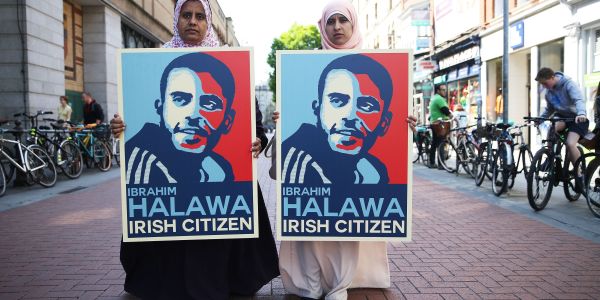Ireland must consider breaking diplomatic ties with Egypt over the detention without trial of a young Irishman for the past three years, Dublin’s parliament has heard.
Trade sanctions against Cairo were also urged over the “nightmare” treatment of Ibrahim Halawa, who was arrested aged just 17 as he sought refuge in a mosque during a political protest in 2013.
His mass trial – alongside almost 500 co-defendants – was postponed again for the 14th time last week and put back until October.
Mr Halawa, a student from south Dublin, has spent more than 1,000 days in a prison where conditions were described by Amnesty International as “truly horrific”.
The Irish parliament, the Dail, has unanimously backed a cross-party motion demanding his immediate release and attacking the “unacceptable infringement of his basic human rights”.
Foreign Affairs Minister Charlie Flanagan spoke of his “acute frustration” at the failure of persistent diplomatic efforts to secure the young man’s return home.
These have included two face-to-face meetings between Taoiseach Enda Kenny and Egyptian president Abdel Fattah el-Sisi, he said, as well as telephone calls as recently as last week.
“This case remains the highest consular priority that we have and I will do everything possible to secure the return of Ibrahim Halawa and see him back in Ireland as soon as possible,” Mr Flanagan told the Dail.
But during a special parliamentary debate on the case, Mr Flanagan was urged to take a more hardline approach with the Egyptians, including the consideration of a special delegation to Cairo, trade sanctions and the suspension of diplomatic ties.
Catherine Martin, deputy leader of the Green Party, said if all diplomatic efforts fail “it may become necessary that some consideration be made to suspending diplomatic relations”.
“Ibrahim Halawa, we say his name loudly and clearly here today, so Egypt hears our one united voice,” she said.
“Ireland will not stand for this.”
Roisin Shortall, a former junior minister and co-leader of the Social Democrats, said everyone in the Irish parliament accepted Mr Halawa’s detention “is an outrage”.
“It is now undoubtedly time to step up official efforts and consider trade sanctions if that is what is required,” she said.
Transport Minister Shane Ross said some of the suggestions had merit, particularly a full parliamentary delegation to Cairo.
“It is utterly and totally foreign and alien to us that this would happen in the civilised world,” he added.
Mr Halawa’s family, who were in the Dail for the debate, are to reapply for a presidential decree in the latest attempt to secure his freedom.
They say he has been tortured, received electric shocks, beaten, spat on and moved without their being made aware of his whereabouts.
He is also facing a possible death penalty.
Mr Halawa was arrested in August 2013 in the Al Fath mosque near Cairo’s Ramses Square where his family said he was taking refuge as a “day of rage” was held over the removal of president Mohamed Morsi.
His sisters were released on bail.
Amnesty International has called on the Egyptian government to intervene to secure Mr Halawa’s release through the use of pardons and presidential decrees.
